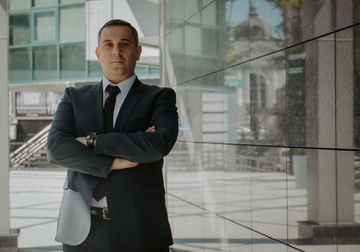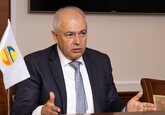
Veaceslav LUCHIANENCO: "MOGO hopes for dialogue and balanced decisions of the regulator when the NBCOs market passes under the supervision of the NBM"
Interview by InfoMarket Agency
There are 151 non-banking credit organizations (NBCOs) operating in Moldova, and another 14 are in the process of liquidation. NBCOs can be classified by types of lending: quick and short loans, business loans, mortgages, car loans. As a rule, each organization chooses for itself the main type of credit activity. One of the forms of car loans is leasing. The industry, which emerged in 2002, initially dealt mainly with new cars, later expanding the range up to 5-year-old cars. The main reason for the restrictions on the age of leased cars is Moldova’s insurance market’s lack of practice regarding CASCO insurance for cars over 10 years old.
There remained a niche for lending used cars without the obligatory CASCO. This suits certain people, especially on an annuity basis (payment in equal amounts). But this carries additional risks for the lender; risks that should be offset by the corresponding interest rate. This niche in Moldova was occupied in 2017 by the MOGO company, a member of the MOGO Finance group. The group is present in 11 markets of Eurasia and Africa and is currently rebranding itself and will be called Eleving Group. In four years, MOGO Loans, with an indicator of 262.4 million lei, ranked 12th in the market in terms of assets. In NBCOs, the size of assets, as a rule, indicates the funds available for lending - already provided or awaiting their borrowers. The company is one of the ten most profitable NBCOs in Moldova; it earned 12.3 million lei in 2020 and 5.3 million lei in the first quarter of 2021. InfoMarket Agency found a reason to meet with the Chief Executive Officer of MOGO Loans Veaceslav LUCHIANENCO.
InfoMarket: You rank 12th in terms of assets in the NBCOs market, and there are chances to enter the top ten in a year or two, but you are narrowly specialized, to what extent is this justified? Is it for this reason that the MOGO business has not taken root in some countries?
Veaceslav LUCHIANENCO: Since 2012, the MOGO Group has been focusing on financing motor vehicles. This is what we know how to do, what our processes are aimed at, what we have perfected in different countries and on different continents. Even if we leave some countries, we still learn lessons, improve practices and apply them in other countries.
InfoMarket: One of the main differences between an NBCO and a bank is the absence of a deposit portfolio. Where do you find funding?
Veaceslav LUCHIANENCO: There are two sources. The first is the listing of our main shareholder MOGO Finance on the Frankfurt Stock Exchange, the second is the Mintos crowdfunding platform. It turns out hybrid financing and money is poured into the company as needed.
InfoMarket: When you entered the Moldovan market, leasing companies financed the purchase of cars at 12% per annum. Your rates are five times higher!
Veaceslav LUCHIANENCO: The company started operating in leasing second-hand cars, (and this was already the end of leasing) with rates of 40-60%, I'm talking about effective rates. Yes, our rates are much higher than in the market, but then there was no market for financing the purchase of high-mileage cars. Leasing companies require CASCO, and we focused on cars aged 10-15 years: no insurance company offers CASCO for such cars. Nobody wants to take risks. Our success is that we entered the market at risk, which was reflected in the rate; and also in the fact that we initially offered long-term loans, and they still remain the largest in the market - up to 84 months (7 years).
This year we are entering a new segment. Primero product, which over time may become one of the main sales channels, is lending to newer cars, costing from 5 to 15 thousand euros. It is aimed at customers who want to exchange their car for a newer one, and the effective lending rate for Primero is 25.68% per annum.
Today, most of our rates vary from 25% to 60% per annum, but they can be even higher if the loan is issued for a very short period or non-standard payments are set at the request of the client. The shorter the term, the higher the effective interest rate.
InfoMarket: What do you mean when you talk about the end of leasing?
Veaceslav LUCHIANENCO: Leasing is less risky for NBCOs than loans, because the car is registered with the company, and this disciplines the borrower. But today, almost the entire market for financing used cars has switched to working with loans as a result of the increased consumer demand for this type of service. This means that the car is registered in the client’s name, but with an encumbrance from the lender. Our success was due to the fact that we quickly reoriented to loans, satisfying the needs of our clients in car financing.
InfoMarket: Who is your average customer?
Veaceslav LUCHIANENCO: He works in Moldova or abroad, he is 30-40 years old and he wants a car worth 7-8 thousand euros, of which he raised 1 thousand euros. He needs a loan for an average of 65 months and it is convenient for him to pay in equal installments. The fastest loan is 30 minutes. The longest time, if the client does not know what to buy, is 2 days. One of the principles by which MOGO has been working since 2012 is to increase the mobility of the population, and this is what we strive for. Everyone wants to drive new cars, but not everyone can afford it. But this does not mean that people have no right to fulfill their need for freedom of movement. We finance this.
InfoMarket: Were there cases when borrowers disappeared along with their cars? How many cases were sent to courts in four years?
Veaceslav LUCHIANENCO: There were such cases. But we have special debt collection procedures. This is an established process and we practically do not involve collection companies in cooperation. Approximately 10% of the loans were sent to the court. We try to be flexible towards clients, especially since the beginning of the last year, towards those who endeavor in paying the installments. The paying capacity has improved markedly this year since many have returned to Moldova due to the pandemic, and cars are easier to find.
InfoMarket: And if the car is severely damaged during the loan, how can the borrower get the money back?
Veaceslav LUCHIANENCO: Our client has several options, but the most correct one is to contact us. We can either increase financing for repair or replacement, restructure the loan. We can also help, if necessary, choose a car from our partners; these are car parks where the clients can use the trade-in service, replace or restore the car.
InfoMarket: MOGO is a profitable business, and your shareholders are foreign companies. Is the profit withdrawn from Moldova in the form of dividends?
Veaceslav LUCHIANENCO: All the earned profit remains in Moldova and is directed to the development of the company. Not a single leu (MDL) has yet been withdrawn from the country in the form of dividends. On the contrary, private equity capital was invested - it is 22 million lei, and we attracted more than 250 million lei to the company in the form of credit funds. Our current assets are almost 300 million lei.
InfoMarket: On what conditions do you raise money? And are you financed in Moldova?
Veaceslav LUCHIANENCO: We would very much like to be financed in the domestic market; this would allow us to optimize the costs associated with foreign exchange operations: exchange, transfers, and foreign exchange risks. But, unfortunately, Moldovan banks need solid collateral, usually real estate, as well as a long-term successful business history. The cost of crowdfunding resources that we use is much higher than the money attracted for deposits by Moldovan banks. Any individual has access to information on the mintos.com crowdfunding platform and can invest today at 10-11% per annum in foreign currency. By the way, four Moldovan companies are attracting resources through this platform. Nevertheless, not all companies can access Mintos, as there are requirements for participants in terms of reporting, transparency, profitability.
InfoMarket: Events are developing in such a way that from July 1, 2023, NBCOs will pass under the supervision of the National Bank of Moldova (NBM); the respective law has already taken effect. The reason why the NBM has not done this so far is that banks accept deposits from individuals, and NBCOs lend from their own funds at their own peril and risk. Many bankers support the initiative to apply the same requirements to NBCOs as those applied to banks. To what extent is this fair in relation to NBCOs?
Veaceslav LUCHIANENCO: I do not quite understand the turmoil in the NBCOs market and the fear of passing under the supervision of the NBM. What will essentially change? The NBM also stands for a free market and will not impose any restrictions on interest rates. We follow the laws and regulations anyway. After the transition, the NBM will have questions about monthly, not quarterly reporting, but in many companies, for example, in our country, it is already formed daily in accordance with international standards. We analyze the risk fund every day, we comply with the high requirements for financial and operational reporting that our shareholders and our auditor, one of the Big Four companies, KPMG, require from us, which is the guarantor of the quality of the financial statements we provide.
I advocate that one professional regulator be involved in the supervision. Whatever one may say, the NBM has more resources than the NCFM (the National Commission for the Financial Market), more experience, including working with international investors. I hope for a greater understanding from behalf of the National Bank in relation to the funds we attract from abroad and the use of financial instruments. After all, we will continue to attract funds in the external market, apparently, for a long time. It is unlikely that any loans in Moldova will be significant in our share of borrowed funds. And I have no illusions that, after passing under the control of the NBM, we will begin to attract deposits - this is not our business, focus and goal.
For our company, this may mean a more simplified dialogue regarding some of our initiatives, if the matter concerns crowdfunding platforms, fiscal policy in combination with risk fund management. I look forward to dialogue, understanding, and balanced decisions. And finally, the MOGO group has experience of working with the National Bank: the company in Romania is under the supervision of the National Bank of Romania.
InfoMarket: Will the transfer under the NBM's supervision “clean up” the market, in your opinion? After all, today there are 151 NBCOs working in Moldova, and this is not a little.
Veaceslav LUCHIANENCO: I think everything will remain at the same level, with minor changes. Mergers and acquisitions, the exit of players and the entry of new ones to the market are still taking place. Companies will be able to adapt to reporting requirements and become more efficient. The availability of financing in the domestic market and the regulator's understanding of the importance of external financing sources for the country's economy will create more favorable conditions for most NBCOs, which will have a positive effect on the cost of loans for borrowers.
InfoMarket: What do you lack or what hinders your work in Moldova?
Veaceslav LUCHIANENCO: We do not have enough funding in the domestic market, for optimization we would like to have up to 10% of assets in Moldovan lei (MDL). But the main difficulties are connected with the legislation, in which there are contradictions. On the one hand, we must adhere to a clear procedure for informing the borrower who is behind the repayment schedule, observe strict time frames: 15 days, 30 days, travel and fix departures, etc. And the borrower has a lot of opportunities to delay the process, I mean the court hearings.
By the way, in June we became a member of the American Chamber of Commerce in Moldova (AmCham). We want to communicate more effectively with the tax inspectorate and with other government agencies. We hope that with the help of AmCham we will be able to better find common ground with the regulator on emerging problems.
InfoMarket: MOGO operates in 11 countries. You left the Balkans, but apart from Eastern Europe, you also operate in Uganda, Kenya and Uzbekistan. Are there any fundamental differences in these markets?
Veaceslav LUCHIANENCO: Each market is unique in its own way. As for Africa, the main difference in the market is that there it is a huge demand for motorcycles and mopeds, which are not in great demand in our country. And in the markets of the Baltic countries, Moldova, Romania and Belarus, there is the opportunity to work more efficiently than in the Balkans, while investing shareholders' money more intelligently.//09.07.2021 - InfoMarket.





